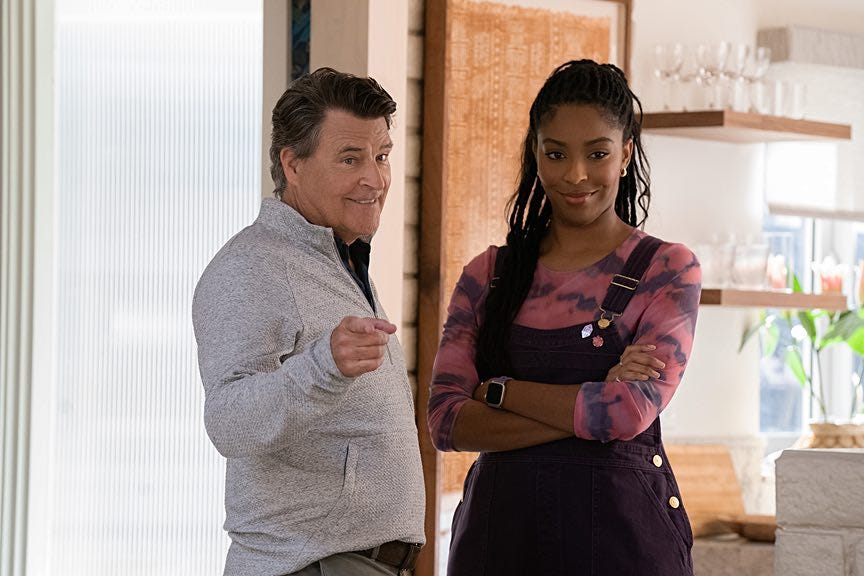Found in translation
A 'My Brilliant Friend' tribute, a shockingly good 'Citadel' spin-off, the 'Disclaimer' finale, and more
This week’s What’s Alan Watching? newsletter coming up just as soon as I remind you that the dead don’t menstruate…
Best Friend forever
Both of this week’s Rolling Stone columns are about subtitled international series. The first is a tribute to My Brilliant Friend, whose series finale will debut on Monday night. This is a show I adored in its first season, and in its second. But for a variety of personal and professional reasons, I just never got around to Season Three, and as this final season was about to debut, I resolved to catch up by any means necessary(*) so I could write about it in time for the conclusion.
(*) This included watching a couple of episodes with the English audio track on, which offered dubbed English dialogue, but also had audio description for people with visual impairment. That’s an option I’ve been aware of forever but never tried before. It seems a very imperfect science, best meant for material without a lot of dialogue, because there’s only time to describe what’s happening onscreen when people aren’t speaking. This is a hugely talky show, with the adult Elena narrating the majority of moments that would otherwise be dialogue-free. So the description is both threadbare and fairly random.
Fortunately, I was able to get everything done in time. My new column about the show alludes to things that happen in the finale, but spoils nothing of importance. (The existence of Elena Ferrante’s books, and the show’s relative faithfulness to them, means anyone who wants to know what happens can just Google it.) My Brilliant Friend was a tremendous piece of work, but it has yet to be nominated for a single Emmy, and I feel like I wasn’t an anomaly as a critic who raved about the first season and then didn’t really write about it again. (Though I did place Season Two on my best of 2020 list.) We’ve seen with Squid Game, Shōgun, and the general boom in K-drama that subtitles are no longer the barrier to entry for American audiences that they once were. But it seems like it’s easier for audiences to make that extra effort with bigger and/or more populist stories than for something as intimate and nuanced as this. Hopefully, it grows bigger in death than it was in life.
I love you, Honey Bunny?
Last year, I reviewed Amazon’s Citadel, a hilariously presumptuous attempt to reverse-engineer an international action show franchise that never bothered to make the first show in said franchise any good. I did not expect to check out any of the globe-trotting spinoffs, but a critic pal insisted to me that the India-based Citadel: Honey Bunny was, in fact, a lot of fun, and I warily put on the screeners. To my pleasant surprise, my friend was right, as I wrote about at length. Honey Bunny, about a struggling actress recruited into the spy game by her stuntman friend, isn’t going to reinvent the wheel, but it’s a solidly-made example of a basic idea — “sexy spies doing sexy spy things” — that the entertainment industry keeps returning to because it works. And the best part is, zero knowledge of the other shows is required, even though it’s technically a prequel to Original Recipe Citadel, with one character being the younger version of Priyanka Chopra Jonas. It works almost entirely on its own.
Based on a half-true story
The Disclaimer finale dropped earlier this week. You already know my overall thoughts on the show from my review, so let’s hit a few spoilers that I couldn’t discuss then for obvious reasons.
First, it was clear from very early on that Nancy’s book couldn’t be telling exactly what happened in Italy, since the only people who knew were Jonathan, who died; Catherine, whom we know never told Nancy anything; and Nicholas, who was a small child at the time. So once you recognize that Nancy extrapolated most of this from Jonathan’s photos and what the cops told them, it’s not hard to make the leap to Jonathan being the monster in the story, not Catherine. For some people I’ve spoken with, this is a fatal flaw for the show (and possibly with Renée Knight’s book, which I haven’t read). But even though I could see where this was going well before Catherine told Stephen the truth, I wasn’t bothered. It’s a story about stories, and how the lines can blur between fact and fiction. I wasn’t watching for the twist, but to see how everyone responded to this heightened situation, and to enjoy the performances of Kline and Blanchett. I’ve loved his work throughout this, and I thought she was particularly terrific in these last couple of episodes, once we knew what was really going through Catherine’s head this whole time.
The other complaint I’ve heard is that too many people behave implausibly based on the situation: Catherine doesn’t insist more vocally to either her husband or her colleagues that the book is untrue, Robert doesn’t show enough curiosity about what might have happened, etc. To that, I would say a couple of things. One is that people do not always behave rationally, whether in normal situations or extreme ones like this. For Catherine, the book is the return of a nightmare she thought she had long since left behind, and that she’s never had the emotional ability to discuss with anyone. For Robert, the book seems to confirm every fear he’s secretly harbored about his marriage. How they respond tracks well enough for me, especially since the whole show is, again, taking place in such an exaggerated universe, as we see elsewhere in Kline’s performance, the way Alfonso Cuarón shoots exterior lighting, etc. Nancy’s book is ultimately a fantasy, and so is Disclaimer itself.
Odds and/or ends
This week’s Shrinking brings us to the midpoint of Season Two, and deploys some more ace guest stars, with the great Kelly Bishop playing Paul’s ex-wife, and Christa Miller and Josh Hopkins having a Cougar Town reunion. I’ve been particularly impressed by a couple of things through this batch of episodes: 1)How expertly the show has expanded Ted McGinley’s role, weaponizing his innate likability and easygoing nature to make that into a great recurring source of humor; and 2)How deftly the show continues to juggle the serious and silly moments. On many shows, the Sean subplot in this week’s episode about his dad and his demons would not fit comfortably alongside a scene where Jimmy acts out an Andre the Giant voice for his penis. Here, though, the balance continues to work. (For that matter, the introduction of Hopkins’ character — an ex of Liz’s whom Derek clearly has heard a lot about over the years — gives McGinley a chance to do some more shaded and serious work.)
Among the many achievements of this week’s marvelous Apocalypse Now parody episode of What We Do in the Shadows is that it took “Fortunate Son,” a song that should by law never be allowed to be played in another movie or TV show after decades of overuse, and made its placement feel absolutely perfect and hilarious.
Earlier this week, the Television Critics Association announced that winter is not coming — or, at least, that the 2025 winter TCA press tour isn’t. There are still plans for an in-person tour in the summer, but there weren’t enough interested outlets on the industry side to make a winter tour make fiscal and logistical sense for all involved. My specific duties at Rolling Stone have kept me from attending tour for the last five or six years, and the event — as well as the media landscape in which it takes place — has changed enormously from when I first started attending almost [checks notes] 30 years ago. Among those shifts: once upon a time, summer tour was the big deal, because its primary purpose was to discuss and promote the new shows each broadcast network would be debuting that fall. These days, with so much content now on cable and streaming, and with the most highbrow of that content usually earmarked for the spring, winter tour has generally been more interesting and useful for quite some time now. Like the business it’s designed to cover, press tour needs to keep evolving. Hopefully, it will get the chance to in the coming years.
That’s it for this week! What did everybody else think?






Really pleased you've covered My Brilliant Friend. I've been watching since the first season and feel I'm only one. It's such a nuanced and rich show. It feels somewhat miraculous we got four years of it. I'll miss it but it'll be one I'll revisit when enough time has passed. Also I'm in awe of how Somebody Somewhere does so much with so little. There have been two episodes and I've cried a lot during both. It doesn't feel like I'm watching TV but more that I'm there in the room with these characters. Another marvel that I'll miss when it ends.
Maybe Disclaimer would be a bit easier to swallow if it all wasn't so portentous. We're reminded, through every implausible twist and turn, that this is Serious.
If the plot would collapse if one character uttered a single three-word sentence to stop the torments of Job she's being put through, it's pretty rickety.